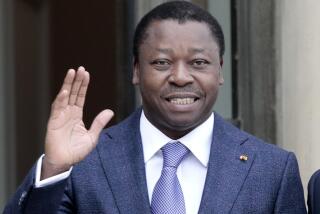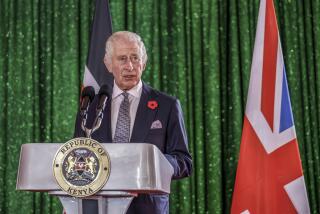Controversy marks Kenya’s adoption of new constitution
- Share via
Reporting from Johannesburg, South Africa — President Mwai Kibaki signed Kenya’s new constitution Friday, describing the occasion as the greatest day since independence in 1963. But the presence of Sudanese President Omar Hassan Ahmed Bashir, wanted on charges of genocide and crimes against humanity, brought controversy to the event.
Bashir defied an arrest warrant by the International Criminal Court to accept the Kenyan government’s invitation, dismaying human rights observers. Kenya is obliged to arrest Bashir as a signatory to the Rome Statute, which established the court.
Newspapers called the new constitution the birth of the Second Republic. Thousands of Kenyans gathered at Uhuru Park in downtown Nairobi to watch the ceremony, cheering as Kibaki held the constitution aloft and slowly turned full circle so all could see.
“Today is a great day for Kenya. This is the most important day in the history of our nation since independence,” said Kibaki, who campaigned strongly for the constitution. The document received more than 70% support from voters in a referendum this month.
“We have opened a clean new page on our books. On that page we begin writing the story of an equal and just society,” said Prime Minister Raila Odinga, who also campaigned for the constitution. Both leaders and Kenyan lawmakers were sworn into office after the promulgation of the constitution.
The constitution, which replaces one that had been in effect since independence, was written as part of a 2008 power-sharing deal a year after violence and accusations of fraud marked a bitter presidential election that saw Kibaki declared the winner over Odinga.
Critics said extending an invitation to Bashir undermined the principles of good governance and accountability that the new constitution is supposed to enshrine. Bashir’s arrest warrant relates to atrocities by Sudanese troops in the Darfur region of western Sudan, where 300,000 people have died.
Bashir was one of several invited regional leaders who released white doves as part of the ceremony.
Last month the African Union urged the United Nations to suspend the arrest warrant for the Sudanese leader.
The European Union and ICC said Kenya was obliged to arrest Bashir, and Amnesty International called on all African countries to arrest anyone the court has charged if given the opportunity.
“It is disturbing that the Kenyan government is celebrating a new constitution — the national centerpiece of the rule of law — while obstructing justice for victims of such serious violations in a neighboring country,” Amnesty International spokeswoman Michelle Kagari said.
Critics said the invitation threw doubt on Kenya’s commitment to the ICC investigation into violence after the country’s 2007 election. The court is expected to charge a number of Kenyan officials in coming months.
Kenyan officials were defiant, however. Foreign Minister Moses Wetangula told the Nation newspaper it would be un-African to arrest Bashir during his visit.
“He is a state guest,” Wetangula said. “You do not harm or harass your guest. That is not African.”
But Deputy Defense Minister David Musila said Kenya had brought shame on itself and he called for Bashir’s arrest.
After decades of poor governance and colossal corruption, Kenya’s new constitution is meant to usher in a new era of accountability, with American-style checks and balances.
The document does not take full effect immediately; it requires parliament to draft and pass dozens of laws.
The powers of the president will be pared back and power devolved to counties. A Senate will be introduced and voters will be able to dismiss poorly performing legislators — although how this would be done has not been determined.
The constitution provides a bill of rights precluding discrimination on any grounds, including gender, religion and race. It also provides for the return of land grabbed illegally in the past, when politicians parceled out property to their cronies.
In an editorial, the Daily Nation warned that the document will be meaningless if politicians do not abide by the provisions and citizens do not work to ensure it is respected.
“A new constitution will not by itself put food on everyone’s table, eradicate disease, illiteracy and poverty, ensure housing for all or roll back decades of theft, corruption, human rights abuses and destruction of the environment,” the editorial said.
“What it does is provide an enabling environment for all Kenyans to live up to their true potential; the condition in which each and every individual in this land can realize his or her goals and aspirations in an atmosphere of freedom, liberty, human dignity and equal rights.”
robyn.dixon@latimes.com
More to Read
Sign up for Essential California
The most important California stories and recommendations in your inbox every morning.
You may occasionally receive promotional content from the Los Angeles Times.













